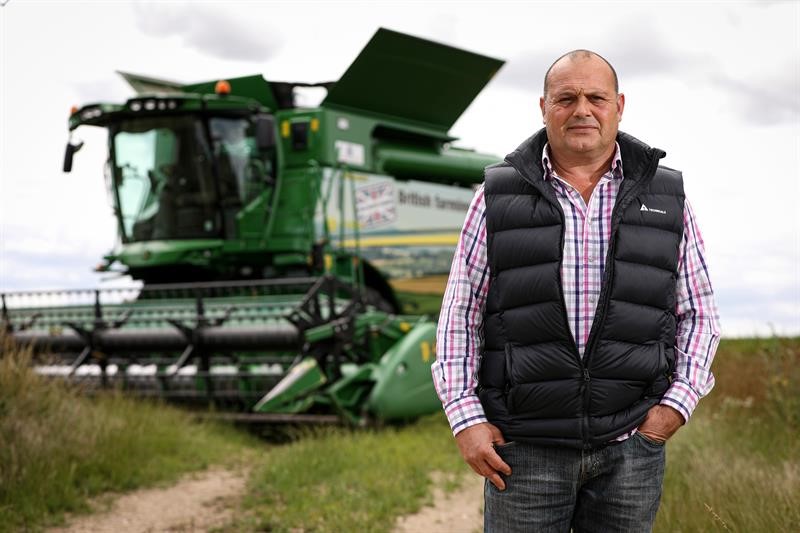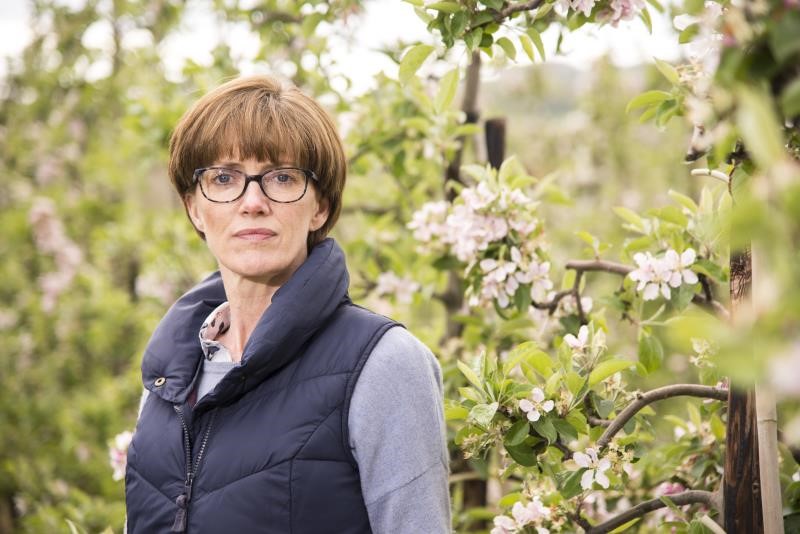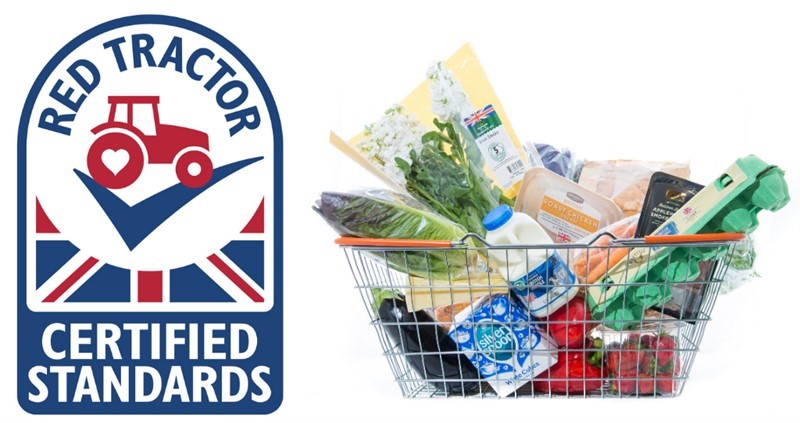The revised standards will apply from 1 November 2021. Click on the links below to read about the key changes for your farming business.
NFU response to the new Red Tractor standards

Responding to the announcement, NFU Deputy President Stuart Roberts, pictured above, said:
“Following significant feedback from the NFU and farmer and grower licensees, Red Tractor has developed the right standards to progress our industry, while balancing the needs of farmers with the evolving demands of shoppers and the supply chain.
“I would like to see Red Tractor embrace the eight principles that the NFU has set out for future standards development and embed these within the Red Tractor process. In the development of bolt-ons, Red Tractor must ensure these are more meaningful for farmers, increase relevance and integrity within the food supply chain, and importantly, deliver value back to the farm. Farmers cannot be burdened with additional standards which do not deliver something back to them at the farm gate – these standards cannot become the norm.
“There are significant opportunities in the future for the Red Tractor assurance scheme both at home and, as new trade deals are developed, to help bolster ‘Brand Britain’ as we take British food to new, global markets.
“Now more than ever, we need to ensure that all our standards on British food, whether for animal welfare, food safety or environmental protection, meet the needs of both farmers and the great British public.”
Read the NFU's eight key principles for developing food assurance standards
The NFU submitted a thorough and detailed response to the Red Tractor 2021 Standards Review. We called for a fresh approach and set out eight key principles to guide the standards body to improve its offer to scheme members.
These eight principles are:
- Continue to retain trust and support growth in the domestic market for British food.
- Provide an assurance platform for growth in the export market for British food and ensure high value exports have robust assurance supporting traceability claims.
- Retain its leading position on cost effective assurance and protect members from inspection and regulatory duplication. Any additional costs associated with implementing new standards should be supported with a clear and simple cost benefit analysis or business case.
- Be empowered to challenge duplicity within the marketplace and not facilitate the hypocrisy of buyers' sourcing policies which undermines domestic standards.
- Seek to add value through segmentation and market differentiation where there is a need to deliver different value propositions to different markets, without inflating the core standard and eroding value to scheme members.
- Provide marketing choice for buyers. Scheme options, or bolt-ons, could provide competition for cost-effective or a more practicable alternative for brands and scheme members alike.
- Provide a viable but discretionary alternative to new or increasing regulatory burdens and it should deliver efficient solutions in areas that are susceptible to regulatory burdens.
- Explore the opportunities for inspections to be driven by outcomes and data, and where possible reduce the burden of inspection and add value back to farmers
The Red Tractor consultation saw input from all key stakeholders including farmers, processors, retailers and vets. Some 3,000 pieces of feedback were received by Red Tractor through meetings, emails and phone calls.
Read more: Download the NFU's full response to the Red Tractor 2021 Standards Review
Key changes for each sector
Beef and lamb
- NEW: Following recommendations from the Farm Animal Welfare Council and European Food Safety Authority, tethered housing systems, for stock of any age, will not be permitted on Red Tractor farms. In the short term, derogations will be offered, and visits will be made to the small number of members still tethering their cattle.
- NEW: Farms will be asked how they are taking action to eradicate bovine viral diarrhoea. This needs to be documented in a health plan and implemented. This new recommendation will become a full standard from October 2022, allowing members a lead time for a change in system or testing routine where necessary to control endemic disease.
- NEW: All farms with workers must have a written health and safety policy – this is a slight advance on the legal baseline which only applies to businesses with more than five employees. Given high fatality figures in the industry Red Tractor believes it is essential to check policies are in place and communicated to workers.
- NEW: Efficient and meaningful health planning builds on management techniques for continuous improvement and encourages a move to a proactive management system. The health plan now needs to be signed, dated and reviewed annually by a nominated vet who should visit the farm at least once a year.
- UPGRADED: At least one person on farm must have undertaken medicine training to help raise awareness of antimicrobial resistance and drive medicine use best practice. This is currently a recommendation and follows a similar change in the dairy sector in 2019.

NFU livestock board chair Richard Findlay said:
“We have been fully engaged throughout the consultation processes as we have NFU representatives sitting on the Red Tractor beef and lamb sector board, as well as the Technical Advisory Committee, and we have consulted widely with our national and regional boards to achieve the best outcome for our members.
“The revisions to the standards are broadly in line with what we fed back to Red Tractor. We recognise that the industry needs to continue its progress towards tackling BVD and strengthening our approach to health planning. It’s also good to see the inclusion of a standard that seeks to improve our health and safety record and I believe a written policy will go a long way to improving practical actions on farm.
“I’m certain Red Tractor assurance is one of our industry’s greatest assets and we must continue to support this scheme while ensuring standards remain relevant to the UK beef and lamb sector.”
Chicken
- REVISED: Updating our standards with best practice, on all grower units, enrichment now needs to be provided and evenly placed in the shed by day three at the latest rather than day seven as currently.
- REVISED: The free range and enhanced welfare standards require only slower-growing breeds – the list of acceptable breeds has been updated in line with current research. This means we can give a guarantee to consumers that only slower-growing breeds are used in our free-range standards as their growth rates are better suited to this production system.
- REVISED: To meet customer and consumer expectations, all broiler, poussin, and free-range units must meet the minimum standard of windows at 3% of the floor area by October 2023.
- UPGRADED: A heat stress policy must be demonstrably implemented on the farm. Heat stress continues to have a significant impact on bird mortality.
- NEW: All farms with workers must also have a written health and safety policy – this is a slight advance on the legal baseline which only applies to businesses with more than five employees. Given high fatality figures in agriculture Red Tractor believes it is essential to check policies are in place and communicated to workers.
- NEW: There are a number of changes for hatchery eggs to align with turkeys and ducks, including fumigating and sanitising eggs prior to setting, temperature and humidity-controlled storage rooms and records of checks, improved egg traceability and transport of eggs and chicks.
- UPGRADED: We are strengthening our standards on mycoplasma testing for breeder layers. Testing is in line with the Poultry Health Scheme requirements, testing records for mycoplasma gallisepticum and mycoplasma synoviae must be retained to ensure bird welfare and the prevention of disease.
- NEW: The turnaround times between flocks on farm must now be no less than five calendar days. This will ensure that farms have enough time between flocks to clean and disinfect houses between new flocks arriving.

NFU poultry board chair Thomas Wornham said:
“The NFU’s national poultry board representatives have been engaged with Red Tractor throughout this process and provided extensive feedback on the proposed changes to the standards, following consultation with our members.
“We are pleased that Red Tractor has taken on a number of our suggestions and has amended the proposed standards to make them more fit-for-purpose and practical for farmers. Of course, there are a number of areas where a compromise has had to be made. On those standards, such as the revised windows requirement, we would encourage Red Tractor to work closely with members as they work towards meeting this requirement.
“For the majority of poultry meat producers, Red Tractor accreditation is currently essential for their access to market and our members are proud to be part of the scheme. However, it’s crucial Red Tractor does not lose sight of the reasons it has been successful and that it takes on board the NFU’s eight principles for future working.”
Combinable crops and sugar beet
- REMOVED: A requirement to leave livestock buildings for five weeks between cleaning them and using them to store grain.
- SIMPLIFIED: Grain trailer ID needs to be clearly identifiable and on at least the rear and one side of the trailer, rather than all three sides as currently required. Trailer ID is only necessary when transporting your grain into a third-party intake.
- NEW: All farms with workers must have a written health and safety policy – this is a slight advance on the legal baseline which only applies to businesses with more than five employees. Given high fatality figures in the industry Red Tractor believes it is essential to check policies are in place and communicated to workers.
- REVISED: Many of the requirements of vermin control standards align with the Campaign for Responsible Rodenticide Use Code of Practice which aims to minimise the exposure of wildlife to toxic rodenticides. This means that Red Tractor members can continue to buy rodenticide that they would otherwise be prohibited from purchasing without completing additional training.
- CLARIFIED: Moisture meter calibration can be carried out on farm using reference samples.

NFU crops board chair Matt Culley said:
“It was important that Red Tractor listened to our sector’s concerns during the consultation and the impact the proposals could have on businesses, especially as the combinable crops sector already faces numerous challenges and is undergoing considerable change.
“NFU representatives on the crops sector Technical Advisory Committee worked extremely hard with industry stakeholders to ensure that the development of these standards took the views of our members into account. We did not support all the changes put forward, but we managed to find compromises and consensus from all involved which means these standards can continue to provide a way forward for all and add value to the whole supply chain.”
Dairy
- NEW: Following recommendations from the Farm Animal Welfare Council and European Food Safety Authority, tethered housing systems, for stock of any age, will not be permitted on Red Tractor farms. In the short term, derogations will be offered, and visits will be made to the small number of members still tethering their cattle.
- NEW: In 2020 Red Tractor consulted on proposed standards to ensure the industry delivers on a commitment to eliminate the routine euthanasia of calves by 2023. A new standard is focused on a written breeding and management policy.
- NEW: Efficient and meaningful health planning encourages a move to a proactive management system. A health plan now needs to be signed, dated and reviewed annually by a nominated vet, who should visit the farm at least once a year.
- NEW: All farms with workers must have a written health and safety policy – this is a slight advance on the legal baseline which only applies to businesses with more than five employees. Given high fatality figures in the industry Red Tractor believes it is essential to check policies are in place and communicated to workers.

NFU dairy board chair Michael Oakes said:
"We know that many of our dairy farmer members care deeply about the future of Red Tractor and were keen to take part in this consultation. We collected a huge amount of feedback and used that in our positions on the Red Tractor Dairy Technical Advisory Committee and board. Through this process we believe that we have now seen some sensible new standards developed which help protect the reputation of the UK dairy sector, as well as the removal of some proposed standards which would have caused unnecessary cost and paperwork for our dairy farmer members."
Fresh produce
- REVISED: Strengthened and upgraded approach to field/production site risk assessment to better manage risks from historic and adjacent activities.
- NEW: Protected Cropping section introduced with content relevant to established, protected growing environments (e.g. greenhouse) and new crop production systems (e.g. vertical farms).
- REVISED: Strengthened and consistent expectations for pesticide residue testing.
- NEW: Record keeping systems for introduction of biological controls.

NFU horticulture and potatoes board chair Ali Capper said:
“Throughout the consultation period we have continuously fed in a wide range of grower views and concerns, and NFU representatives have worked hard alongside Red Tractor and other stakeholders to have these views heard during the committees.
“During this process we have ensured that clarity and flexibility have been added into standards to make sure they reflect day-to-day practicalities, and we have also had duplicated standards removed or condensed to reduce the audit burden. Although there have had to be compromises made on some of the standards we will continue to work with Red Tractor to ensure that these will work for all involved.
“It is important that the standards remain relevant to modern farming businesses and it will be essential that they are audited consistently once implemented.”
Pigs
- NEW: All units must put measures in place to minimise the risk of tail biting and avoid the need for tail docking. This includes an annual risk assessment on all units and an action plan on farms rearing docked pigs. Anyone carrying out docking needs to have evidence to support the continued need, including a detailed quarterly veterinary review. Monitoring health and performance is key to ensuring oversight of pig health and welfare.
- UPGRADED: Our enrichment standard, in line with Defra’s Code of Practice, to require specific combinations of enrichment materials and objects, to ensure this important behavioural need of pigs is met.
- REVISED: Stock people need to be robustly trained on pig euthanasia to ensure best practice is maintained. Initial euthanasia training must now be carried out by a vet or via a Humane Slaughter Association course. Where a mechanical device is used for piglet euthanasia, we have aligned our requirements with the Humane Slaughter Association’s guidance to ensure effectiveness.
- NEW: Anyone involved with the care of pigs must now complete online pig welfare training in key areas including best practice around moving and handling pigs to ensure consistent training so that all pigs are always treated compassionately.
- NEW: At least one person on every farm must undertake training in the responsible use of medicines. Where a farm is identified as persistently using high amounts of antibiotics, they must now develop and implement an action plan with their vet to reduce antibiotic use.
- NEW: When there is an outbreak of disease, it can be useful if nearby farms are made aware, so they can tighten their biosecurity. To facilitate this, members must sign up to the Significant Diseases Charter and report disease outbreaks.
- NEW: All farms with workers must have a written health and safety policy – this is a slight advance on the legal baseline which only applies to businesses with more than five employees. Given high fatality figures in the industry Red Tractor believes it is essential to check policies are in place and communicated to workers.
